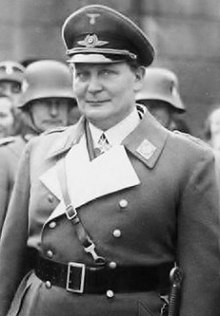Göring
|
Reichsmarschall Hermann Göring |
|
|---|---|

(1934)
|
|
| President of the Reichstag | |
|
In office 30 August 1932 – 23 April 1945 |
|
| President |
|
| Chancellor |
|
| Preceded by | Paul Löbe |
| Succeeded by | none (office abolished) |
| Minister President of Prussia | |
|
In office 10 April 1933 – 23 April 1945 |
|
| Governor |
|
| Preceded by | Franz von Papen |
| Succeeded by | none (office abolished) |
|
Reichsstatthalter of Prussia (Acting) |
|
|
In office 25 April 1933 – 23 April 1945 |
|
| Prime Minister | Himself |
| Preceded by | Adolf Hitler |
| Succeeded by | none (Prussia abolished) |
| Reichsminister of Aviation | |
|
In office 27 April 1933 – 23 April 1945 |
|
| President |
|
| Chancellor | Adolf Hitler |
| Preceded by | none |
| Succeeded by | Robert Ritter von Greim |
| Reichsminister of Forestry | |
|
In office July 1934 – 23 April 1945 |
|
| President |
|
| Chancellor | Adolf Hitler |
| Preceded by | none |
| Succeeded by | none |
| Reich Plenipotentiary of the Four Year Plan | |
|
In office 18 October 1936 – 23 April 1945 |
|
| President | Adolf Hitler (as Führer) |
| Chancellor | Adolf Hitler |
| Preceded by | none (office established) |
| Succeeded by | none (office abolished) |
| Reichsminister of Economics | |
|
In office 26 November 1937 – 15 January 1938 |
|
| Chancellor | Adolf Hitler |
| Preceded by | Hjalmar Schacht |
| Succeeded by | Walther Funk |
| Chairman of the Ministerial Council for Reich Defense | |
|
In office 30 August 1939 – 23 April 1945 |
|
| President | Adolf Hitler (as Führer; 1934–45) |
| Chancellor | Adolf Hitler |
| Preceded by | none (office established) |
| Succeeded by | none (office abolished) |
| Vice-Chancellor of Germany | |
|
In office 10 February 1941 – 23 April 1945 |
|
| Chancellor | Adolf Hitler |
| Preceded by | Franz von Papen |
| Succeeded by |
Vacant Next office holder: Franz Blücher |
| Personal details | |
| Born |
Hermann Wilhelm Göring 12 January 1893 Rosenheim, Kingdom of Bavaria, German Empire |
| Died | 15 October 1946 (aged 53) Nuremberg, Bavaria, Allied-occupied Germany |
| Political party | National Socialist German Workers' Party (NSDAP; 1922–45) |
| Spouse(s) |
|
| Relations | Albert Göring (brother) |
| Children | Edda Göring |
| Parents |
|
| Occupation |
|
| Cabinet | Hitler Cabinet |
| Awards | |
| Signature | |
| Military service | |
| Allegiance |
|
| Service/branch | |
| Years of service |
|
| Rank |
|
| Commands | Luftwaffe (1935–45) |
| Battles/wars | |
Hermann Wilhelm Göring (or Goering;German: [ˈɡøːʁɪŋ] (![]() listen); 12 January 1893 – 15 October 1946) was a German political and military leader as well as one of the most powerful figures in the Nazi Party (NSDAP) that ruled Germany from 1933 to 1945. A veteran World War I fighter pilot ace, he was a recipient of the Pour le Mérite. He was the last commander of Jagdgeschwader 1, the fighter wing once led by Manfred von Richthofen.
listen); 12 January 1893 – 15 October 1946) was a German political and military leader as well as one of the most powerful figures in the Nazi Party (NSDAP) that ruled Germany from 1933 to 1945. A veteran World War I fighter pilot ace, he was a recipient of the Pour le Mérite. He was the last commander of Jagdgeschwader 1, the fighter wing once led by Manfred von Richthofen.
An early member of the Nazi Party, Göring was among those wounded in Adolf Hitler's failed Beer Hall Putsch in 1923. While receiving treatment for his injuries, he developed an addiction to morphine which persisted until the last year of his life. After Hitler became Chancellor of Germany in 1933, Göring was named as Minister Without Portfolio in the new government. One of his first acts as a cabinet minister was to oversee the creation of the Gestapo, which he ceded to Heinrich Himmler in 1934. Following the establishment of the Nazi state, Göring amassed power and political capital to become the second most powerful man in Germany. In 1935, he was appointed commander-in-chief of the Luftwaffe (air force), a position he held until the final days of the regime. Upon being named Plenipotentiary of the Four Year Plan in 1936, Göring was entrusted with the task of mobilizing all sectors of the economy for war, an assignment which brought numerous government agencies under his control and helped him become one of the wealthiest men in the country. After the Fall of France in 1940, he was bestowed the specially created rank of Reichsmarschall, which gave him seniority over all officers in Germany's armed forces.
...
Wikipedia
